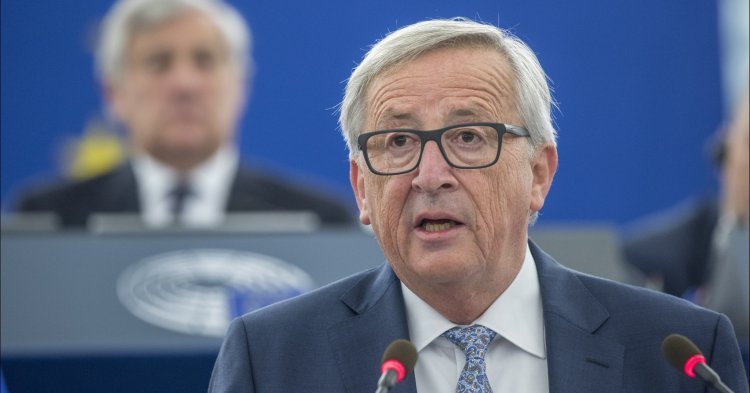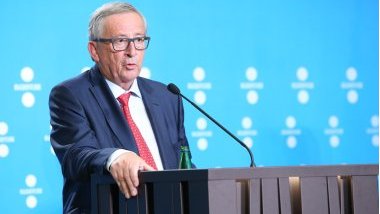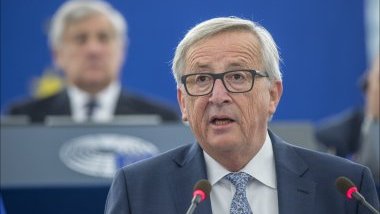Juuso Järviniemi: A plea for institutional clarity
A multi-speed Europe has long been under discussion, and with Emmanuel Macron’s election to French presidency, the idea has gained traction. Today, however, Juncker presented a vision for a Europe united as one. Instead of more institutions and special arrangements, Juncker wants to see less. The challenge is to secure political approval for the ideas among the member states, but if there is success, Europe is set to be stronger.
If a “core Europe” comes into being, it may well consist of Eurozone members. Accordingly, Juncker sought to tie the Eurozone strongly into the EU framework. He rejected the idea of a separate Eurozone Parliament, and called for an existing Commissioner to handle matters related to it. The push for remaining non-Eurozone member states to join the club completes the idea that the Eurozone and the EU should be the same.
The call for clear institutional structures was not limited to questions of the Eurozone. Inviting Romania and Bulgaria to the Schengen Area was another example of reducing the number of exceptions in the EU system. The most remarkable appeal for clarity, however, was the proposal to merge the positions of Commission and European Council President. This federalist proposal would have the potential to streamline leadership in Europe and to bring an answer to the age-old question, “who do I call when I want to speak to Europe?”
Juuso Järviniemi is the Editor-in-Chief of The New Federalist.
Laura Mercier: It’s time to be bold for the European Union
« Helmut Kohl and Jacques Delors taught me that Europe only moves forward when it is bold. ». Jean-Claude Juncker delivered a bold speech on the future of the European Union, announcing many possibilities of reform, in the name of unity and efficiency.
The efficiency of the EU will depend on a better institutional clarity. Juncker approves the creation of a European Minister of Economy and Finance, which would merge with the European Commissioner. Juncker is also in favour of merging the Presidents of the European Commission and the European Council.
Among the priorities of the Commission, one of the most important is to strengthen the democracy and the respect for the rule of law within the EU. « Our Union needs to take a democratic leap forward. ». This was said with the European elections of 2019 in mind: Juncker called the European parties on starting their campaigns earlier than in 2014. He’s in favor of maintaining the system of « Spitzenkandidaten », and supports the idea of transnational lists.
At the eve of European elections, it is urgent and necessary to bring back together the European citizens and the European Union. Europe must build itself and be reformed with the citizens, and on the basis of compromise between the member states. Juncker’s declaration probably won’t find unanimity, and his will to strengthen the inclusion of each member state is a clear message : a two-speed Europe is not the scenario that the Commission wants to follow. By 2019, European citizens need to have a clear vision of the evolution of the EU, and for that, member states must agree on the direction and scenario that they want for the EU. After this ambitious speech, it’s time for the member states to be bold for the European Union.
Laura Mercier is an Editor-in-Chief of Le Taurillon, the French version of the JEF webzine.
Gesine Weber: Create solidarity beyond speeches
Some might call Jean-Claude Juncker a Eurocrat 364 days a year, but one characteristic of the President of the Commission cannot be denied, which is his capacity to give direction-setting speeches on the future of Europe. Juncker demonstrated his proficiency in doing during his State of the Union Address: he speaks about the wind in the sails of the EU, that the EU has to hold course and set its sails towards its future as a democratic, united and strong union of values. Juncker’s pledge is a passionate one, representing a clear confession for an integrated European Union instead of a multi-speed Europe. His words are full of courage and motivation for a departure towards a new Europe, which is a Europe of States and a Europe of citizens at the same time. Juncker’s proposals such as a single European president and the implementation of a defence union by 2025 make the hearts of pro-Europeans flutter.
„We started to fix the roof. But we must complete the job now that the sun is shining and whilst it still is”, according to the President of the Commission. He is right: there has not been any moment within the last years when the consensus on the political level for a deeper integration of the EU was stronger than today. There is a high probability that, once the German elections are held, the French-German couple takes its responsibility and brings up new initiatives, which is a quite promising perspective for the top-down implementation of reforms. Nevertheless, Juncker does not tackle the problem of the smouldering fire of Euroscepticism and growing nationalism at lower levels. This is not only a naïve point of view, but also a dangerous one: at the moment, it seems barely possible that the Hungarian or Polish government support important reforms, nor that they communicate the benefits of an ever closer Union to their citizens in order to convince them.
Juncker’s address catches all those who are already by the side of the European Union. Nevertheless, national governments acting in a European spirit and citizens thinking with a European spirit are indispensable in order to hold the course and set the sails without member states going overboard. This will take some convincing from the side of the EU – by the creation of a de-facto-solidarity and not only a programmatic speech once a year.
Gesine Weber is an Editor-in-Chief for Treffpunkt Europa, the German version of the JEF webzine.






Follow the comments: |
|
